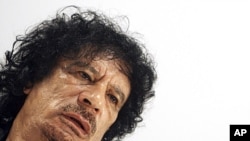With their dramatic assault on the capital Tripoli, opposition forces in Libya claim they are on the verge of defeating Colonel Gadhafi’s regime. But renewed fighting in the city suggests the Libyan leader will not give up his 42-year reign of power easily.
Gunfire and explosions can still be heard in parts of Tripoli - tempering the elation of opposition forces as they stormed the center of the capital Monday, amid claims they had captured one of the Libyan leader’s sons, Saif al-Islam.
His subsequent appearance in front of jubilant supporters on Monday night is an indication of the challenges opposition forces face in trying to oust Libya’s ruling family.
|
The Libyan Rebellion
|
“Frankly we just don’t know what levels of support Colonel Gadhafi still has because Libya has been repressed for so long," said Jane Kinninmont, a senior research fellow for the North Africa program at London analyst group Chatham House. "It is very different from Egypt and Tunisia, where in both countries the national army was a very strong institution. And essentially, at the end of the day the armies withdrew their support for the leader."
"In Libya the situation is very different. Gadhafi never allowed the army itself to become that powerful precisely because he is a very smart guy who knows a lot about how to stay in power,” Kinninmont added.
In recent days opposition forces have made dramatic territorial gains - taking the strategic coastal town of Zawiyah before their assault on the capital. They - and their backers among the international community - say despite the continued fighting, the Libyan leader’s days are numbered.
Fight, run or hide
Colonel Gadhafi has vowed to fight to the death. Jane Kinninmont says his alternatives are to run or to hide.
“It’s possible he could choose to stay and hide in Libya but there are of course scenarios that wouldn’t be that appealing to him, like the Saddam Hussein scenario where he hides for a long time but is eventually caught," she said. "Or the Hosni Mubarak scenario where he decided not to leave Egypt, probably thought he would be shielded by the army but ended up going on trial. On the other hand if Gadhafi does go into exile overseas he does face two risks - he faces the risk of international prosecution through the ICC. He also faces the risk of revenge attacks.”
The International Criminal Court, or ICC, issued arrest warrants in June for Muammar Gadhafi, his son Saif al-Islam and Abdulla Al-Senussi, who is believed to head Libya’s military intelligence.
“The ICC does not have a police force of military force so we only count on the cooperation of the states," said Fadi El-Abdallah, legal outreach officer for the ICC in The Hague. "Now the Libyan authorities have the obligation, under the Resolution 1970 adopted by the unanimity of the members of the U.N. Security Council, to cooperate fully with the court including to implement the warrants of arrest, so to arrest and surrender the suspects. If the suspects go to another state that is party to the Rome statute, there is the same legal obligation to arrest the suspects and surrender them to the ICC.”
Future of Libya
If opposition forces do succeed in ousting Colonel Gadhafi, there is much uncertainty over who would take over.
“One of the big challenges for the opposition now is to try to win more people over, to try to develop a more representative and more inclusive leadership,” said Jane Kinninmont of analyst group Chatham House.
Kinninmont says the dynamics of the Libyan uprising are more complex than those seen in other parts of the Arab world - and the outcome remains unpredictable.















